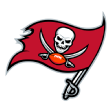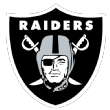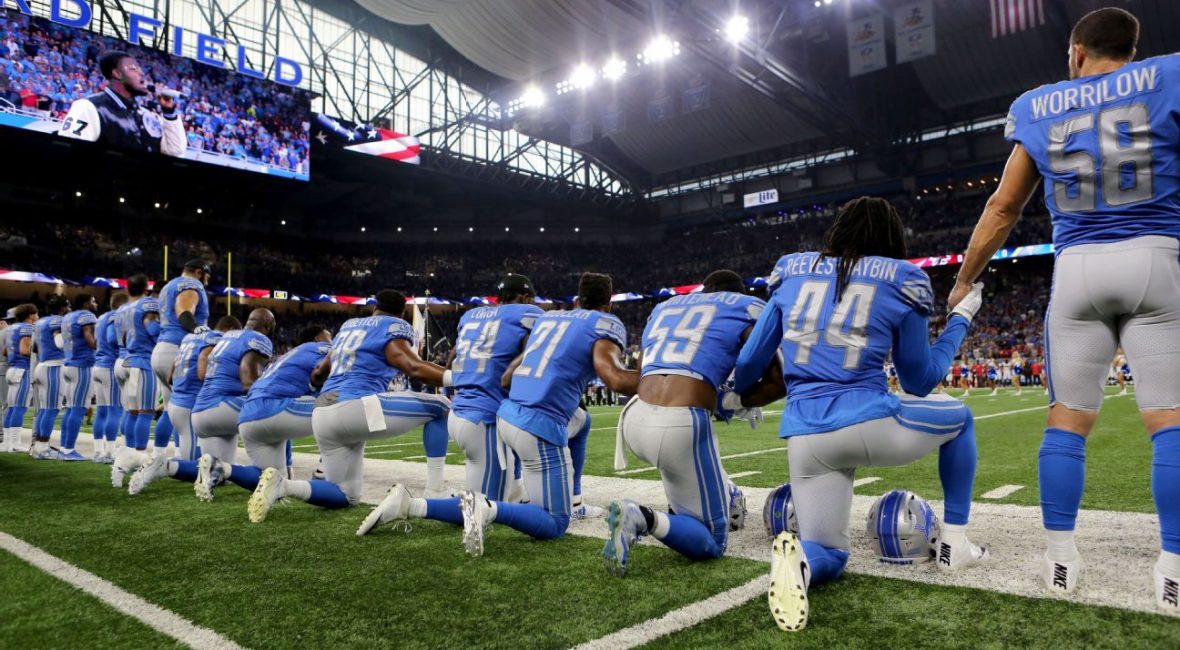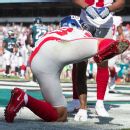NFL Nation reporters predict the outcomes and scores for Sunday’s and Monday’s Week 4 games.
PickCenter
We still don’t know for sure how much to trust the Saints’ defense, since that unit’s big turnaround in Week 3 came against struggling quarterback Cam Newton. But New Orleans should get top cornerback Marshon Lattimore back from a concussion. And Miami’s offense also has been off to a slow start this year, with just six points in a loss to the Jets last week. Also, the Dolphins’ pass defense has actually allowed a higher completion percentage to opposing quarterbacks (79 percent) than the Saints (73 percent). Saints 30, Dolphins 25 — Mike Triplett

The Dolphins are allowing opposing quarterbacks to complete 79 percent of passes this season. Miami’s pass coverage has been shaky, and that’s not good facing future Hall of Fame quarterback Drew Brees. This game has the makings of a shootout, and the Saints’ passing game is too dynamic for Miami to keep up. Saints 28, Dolphins 21 — James Walker
PickCenter

Had Tyrod Taylor and Zay Jones connected on a last-second touchdown pass in Week 2, the Bills would enter this game 3-0. We’ll find out whether Buffalo is for real against the undefeated Falcons, who rank third in ESPN’s Football Power Index — 17 spots higher than the 2-1 Bills at No. 22. The past three games in which Matt Ryan faced a Sean McDermott-coached defense in Carolina, he completed 78 percent of his passes for 1,086 yards, 7 touchdowns, 1 interception and a 131.1 quarterback rating. With the NFL’s top defense in terms of points allowed (12.3), McDermott will have something to prove against Ryan. Falcons 28, Bills 20 — Mike Rodak
The Falcons haven’t played their best game, yet they’re still 3-0. The Bills boast the league’s top-scoring defense at 12.5 points per game and haven’t allowed a touchdown reception, but they haven’t seen the type of offensive firepower the Falcons present. Julio Jones, who said he’s fine coming off a back injury, should get his first touchdown of the season. And the running back tandem of Devonta Freeman and Tevin Coleman — who’ve guided the Falcons to a 7-0 record when combining for 200 yards — should give the Bills fits. Defensively, the Falcons need to hold LeSean McCoy in check. Falcons 28, Bills 13 — Vaughn McClure
PickCenter

The palpable tension in the Steelers’ locker room coming off the anthem mess is a problem. Perhaps that tension will galvanize them, but it seems to be swinging the other way, at the worst possible time. Couple that reality with the Ravens’ stronghold over Pittsburgh in M&T Bank Stadium and the Steelers are poised to drop to 2-2. The Steelers haven’t scored more than 20 points in Baltimore since 2012 and average 12.3 points over their past three games there. Expect an inspired effort from Ben Roethlisberger, but it won’t be enough. Ravens 21, Steelers 17 — Jeremy Fowler
The Ravens have beaten the Steelers four consecutive times at M&T Bank Stadium, and Roethlisberger has thrown four touchdown passes and seven interceptions in his past five games in Baltimore. Baltimore’s defense will have plenty to prove after getting humiliated against the Jaguars. Ravens 24, Steelers 17 — Jamison Hensley
PickCenter

In a battle of 0-3 teams, somebody has to win, right? There’s no reason that shouldn’t be Cincinnati, which took a step forward against the Packers but couldn’t close out the game. The Bengals aren’t as bad as their record. They often play Cleveland close, but the Bengals’ talent should win out here. Bengals 24, Browns 17 — Katherine Terrell

It would be nice to say this is the week the Browns get their win, except last week was supposed to be that week and the Browns rang alarm bells with a poor game. The defense has had trouble with Antonio Brown and T.Y. Hilton and now gets A.J. Green and a Bengals team desperate to avoid embarrassment. Bengals 24, Browns 13 — Pat McManamon
PickCenter

This will be the Rams’ biggest test of the year — on the road against a Cowboys team that won 13 games last season. Dallas’ offense hasn’t hit full throttle yet, but it should soon. The Rams’ defense is better than it has shown the past two weeks while allowing a combined 806 yards to the Redskins and 49ers. But the Cowboys will be a little too much to handle here. Cowboys 31, Rams 21 — Alden Gonzalez

The Cowboys are coming off a short week. The Rams are coming off a 10-day break. Defensive coordinator Wade Phillips would like to make a statement against the team that fired him in the middle of the 2010 season. Jared Goff spent last year hearing how the Rams should have selected Dak Prescott. This game will be another grind-it-out affair but one in which we see Ezekiel Elliott finally look the way he did a year ago since he’s facing the 29th-ranked run defense. Cowboys 23, Rams 20 — Todd Archer
PickCenter

The Titans haven’t won at Houston since the 2011 season. Coach Mike Mularkey said those “in a row” streaks have to stop at some point. It stops Sunday as the Titans neutralize Deshaun Watson’s legs and make life difficult for him with exotic blitzes and diverse looks. Tennessee’s three-headed running attack of DeMarco Murray, Derrick Henry and Marcus Mariota is the NFL’s second-leading rushing offense, and the Titans will do enough to slow down Houston’s trio of dominant pass-rushers. Titans 27, Texans 17 — Cameron Wolfe

One key to the Texans’ back-to-back AFC South titles is how well they have played in the division, including going 5-1 in 2016. Sunday’s game against the Titans is important in the playoff race, because if they lose to Tennessee at home — for the first time since the 2011 season — they would start 0-2 in the division. The Titans will be a tough test, but Deshaun Watson will continue to improve, and the Texans’ defense will rebound from the loss to the Patriots. Texans 24, Titans 20 — Sarah Barshop
PickCenter

Even in Sunday’s loss to Atlanta, the Lions have looked like one of the better teams in the NFL. Minnesota’s defense will be a big issue — particularly with its pressure on Matthew Stafford, but the ninth-year quarterback has shown better timing and elusiveness this year than in years past. Injuries are a concern — particularly with 11 guys, including seven starters, practicing on a limited basis or not practicing at all at least one day this week. Minnesota, though, has its own injury worries at quarterback. Good teams find ways to win games even when they are injured, and since most of the Lions’ injuries seem to be ones in which guys are still going to play, that should give Detroit just enough to beat the Vikings in a close game. Lions 24, Vikings 21 — Mike Rothstein

Minnesota is ranked No. 2 in total offense without Sam Bradford the past two weeks. It looks like Bradford might be out another week, so a number of factors are going to matter for Case Keenum to repeat what he did in Week 3. Luckily, the Vikings have two of the top producing wide receivers, and when it comes to defending Adam Thielen and Stefon Diggs, the Lions won’t want to leave them one-on-one. Detroit’s secondary looked really good last week with three interceptions (a feat also accomplished by Minnesota against Jameis Winston), but overall, Minnesota’s defense is better. The Lions don’t pose much of a rushing threat, but Minnesota will want to slow Matthew Stafford from the beginning and force turnovers to get the offense back on the field. Vikings 23, Lions 14 — Courtney Cronin
PickCenter
The Panthers have moved the ball successfully in the first three games. They rank second in the league in time of possession at 34:01 per game. They just keep shooting themselves in the foot in the red zone. Cam Newton will have an opportunity once again to correct that against the league’s last-place defense in terms of yards allowed, and Christian McCaffrey had what one could call his breakout game with 101 yards receiving against New Orleans. This will come down to whether the defense, ranked No. 1 in the league, can keep Tom Brady and the Patriots’ offense out of the end zone more than a couple of times. That doesn’t seem likely. Patriots 27, Panthers 24 — David Newton
For a Patriots team that has allowed 95 points through three games — its highest total in its first three games since 1994 — Carolina might be the right foe to get back on track. The Panthers have scored just 45 points in three games this season, and Cam Newton isn’t running like he used to, which coach Ron Rivera called his “new reality.” Patriots 33, Panthers 17 — Mike Reiss
PickCenter
Consistency has been the theme of the week for the Jaguars. They’ve had two blowout victories sandwiched around a blowout loss and need to put together back-to-back good games if they’re really going to be a contender in the division. They’re a road favorite for the first time since Week 10 in 2011 mainly because of their defense, which ranks in the top 10 in takeaways, total yards, passing yards and sacks. The Jets may be without RB Matt Forte, and that would be a big loss. Jaguars 21, Jets 13 — Mike DiRocco

The Jets were terrific last week, but let’s hold the parade. This still is a team with many deficiencies. Their best chance to win is to be physical and run the ball, as the Titans did in Week 2, but the Jets have yet to demonstrate a consistent rushing offense (only 89 yards per game). They also could be without leading rusher Matt Forte. This will be an ugly, low-scoring game that will hinge on a key turnover and a long run by Leonard Fournette. Jaguars 17, Jets 16 — Rich Cimini
PickCenter

There are a lot of things working in the Niners’ favor this week. They had extra time off after playing last Thursday night, while the Cardinals are coming off a short week in which they suffered more injuries along the offensive line. The 49ers’ defense won’t be as bad as it was on a short week against the Rams, and though the pass rush has been hit or miss, it’s more likely to hit when the opposing offensive line has been injured and ineffective. The key for the Niners will be for the offense to build on the momentum it gained against the Rams and finally put together a complete performance. The guess here is it happens and the 49ers break through for their first win under coach Kyle Shanahan. 49ers 27, Cardinals 23 — Nick Wagoner

There are a lot of reasons why the Cardinals should lose this game. They’ve given up 11 sacks in the first three games. They’re ranked 31st in rushing yards per game. And they’re letting opposing quarterbacks complete 66.7 percent of their passes of 15 yards or longer. But Arizona is expected to get at least one, possibly two starting offensive linemen back this week, which should help reduce some of the pressure on Carson Palmer and improve the rushing game. Arizona’s front seven on defense also will be too much for 49ers quarterback Brian Hoyer. Cardinals 24, 49ers 13 — Josh Weinfuss
PickCenter
The Eagles have dropped eight of their past nine on the road and have lost their past three games against AFC opponents. Whether you put stock into those kinds of trends or not, the fact remains that the Eagles are expected to be without three key players Sunday: DT Fletcher Cox (calf), CB Ronald Darby (ankle) and RB Darren Sproles, now on IR with a torn ACL and broken forearm. They’re coming off an emotional divisional win against the Giants and are facing a desperate 0-3 Chargers team. They’ll have their work cut out for them. Chargers 27, Eagles 26 — Tim McManus

They’re due. The Chargers are 0-3 and have lost eight consecutive games dating back to last season. But they have not lost at home against Philadelphia since 1974, and at some point, the team’s luck has to turn. The defense, led by Melvin Ingram, continues to play well, and Philip Rivers finally finds a way to consistently get the offense in the end zone. Chargers 24, Eagles 21 — Eric Williams
PickCenter
The Giants are hoping to build off last week’s fourth quarter, when they scored 24 points after totaling just 13 over the first 11 quarters this season. While their passing attack may have gotten on track, they still can’t run the ball (last in the NFL in yards per game), protect the quarterback, make big plays on special teams or, surprisingly, stop the run. Tampa Bay might not have the running game to exploit that final Giant problem, but the Bucs have the defensive front to give New York fits. The Giants are going to have trouble against any team with a decent defensive front, and bad teams find ways to lose on the road. This is one of those spots for the Giants. Bucs 22, Giants 21 — Jordan Raanan
The Bucs expect to be without linebackers Kwon Alexander and Lavonte David, who have become one of the best linebacking duos in the league. That means rookie Kendell Beckwith will be making the calls on defense. Beckwith has a really bright future ahead of him and has played well the past two weeks, but he’s still inexperienced. Getting Brent Grimes back will help, but considering the Bucs’ struggles giving up explosive plays to Case Keenum last week, this one is going to be really tough. Giants 24, Bucs 20 — Jenna Laine
PickCenter
The Raiders, as Khalil Mack said, were just served “a humble pie” on national television by Washington. Not a piece. Not a slice. The whole pie. Oakland’s offensive line, then, should remember what got the Raiders going last November when they dominated the line of scrimmage, rushing for 218 yards. That rushing offense is even better now with Marshawn Lynch and should go back to what worked when the Raiders were healthy on offense, rather than the season finale, when neither quarterback Matt McGloin nor Connor Cook could get the Raiders’ offense moving. Oakland simply matches up well with Denver — Mack vs. Menelik Watson? — and should rebound from last week’s wake-up call. Otherwise, more pies will be coming the Raiders’ way. Raiders 26, Broncos 24 — Paul Gutierrez

In the Raiders’ 30-20 win last November over the Broncos, Oakland rushed for 218 yards. And that will be the proverbial game within the game this time around as the Broncos lead the league in run defense after three games — they held Ezekiel Elliott to 8 yards rushing in Week 2 — and the Broncos’ offense is third in the league in rushing at 143 yards per game. If they do that kind of work on both sides of the ball Sunday, they’ll get the win. Broncos 24, Raiders 21 — Jeff Legwold
PickCenter
This was supposed to be Andrew Luck vs. Russell Wilson, Part II, when the schedule came out in the spring. Luck (shoulder) is still out, and Seattle’s offense is tied for 26th in the NFL in points (16.0) per game. Seattle gets the edge in the battle of 1-2 teams because it’s playing at home, where crowd noise will play a factor, especially because the Colts have been called for a league-high seven false-start penalties this season. The Colts’ offensive line isn’t good enough to protect quarterback Jacoby Brissett, who is making his first NFL road start. Seattle finds its rhythm in handing the Colts their third loss of the season. Seahawks 27, Colts 13 — Mike Wells
Why are the Seahawks favored by 13 points over Indianapolis when they’ve failed to even score that many points in two of their first three games? It’s not just because the Colts are again playing without Andrew Luck. Another reason might be that they’ve been dominant in prime time. Since Pete Carroll arrived in 2010, the Seahawks are 19-3-1 in prime-time games, outscoring opponents 581-298. That includes a 12-1 record at CenturyLink Field, where they’ll host the Colts on Sunday night. Matchups that look easy on paper have turned out to be more difficult than expected for the Seahawks. Their win over San Francisco in Week 2 was the latest example. Frank Gore has been a thorn in the side of the Seahawks’ defense for more than a decade, and T.Y. Hilton burned their secondary when the teams last met in 2013. So, it might not be as easy as the point spread would suggest. But the Seahawks should win to get back to .500. Seahawks 26, Colts 16 — Brady Henderson
PickCenter

The Redskins’ defense has fared well the past two weeks against good offenses in the Rams and Raiders. They dominated Oakland on Sunday night, excelling at limiting the Raiders after the catch. But Oakland lacked the home run threat Kansas City has in Tyreek Hill and Kareem Hunt. They apply more pressure because one miss on them equals six points. Chiefs 24, Redskins 20 — John Keim
It doesn’t always look pretty, but the Chiefs usually find a way against the league’s top offensive teams. They have wins this season over the Patriots and Eagles, both teams in the top 10 in yards and points. Monday night’s opponent, Washington, is in the top 10 in yards and 13th in scoring. Washington is better statistically on defense than either of those teams but hasn’t yet played against an opponent with an offensive capability like the Chiefs, who lead the league in yards per play and are third in points. Chiefs 24, Redskins 17 — Adam Teicher





















